The Washington Consumer Protection Act (CPA) protects consumers from unfair or deceptive business practices. This article covers what the CPA entails, how you can file a complaint, and the remedies available if your rights are violated.
Key Takeaways
- The Washington Consumer Protection Act (CPA) safeguards consumers by prohibiting unfair or deceptive practices in trade, fostering a fair marketplace.
- Both individual consumers and the Attorney General have the authority to file claims against violations, promoting robust consumer protection mechanisms.
- The CPA provides various remedies for unfair practices, including the possibility of double or treble damages, civil penalties, and injunctive relief to ensure accountability and ethical business conduct.
Overview of the Washington Consumer Protection Act
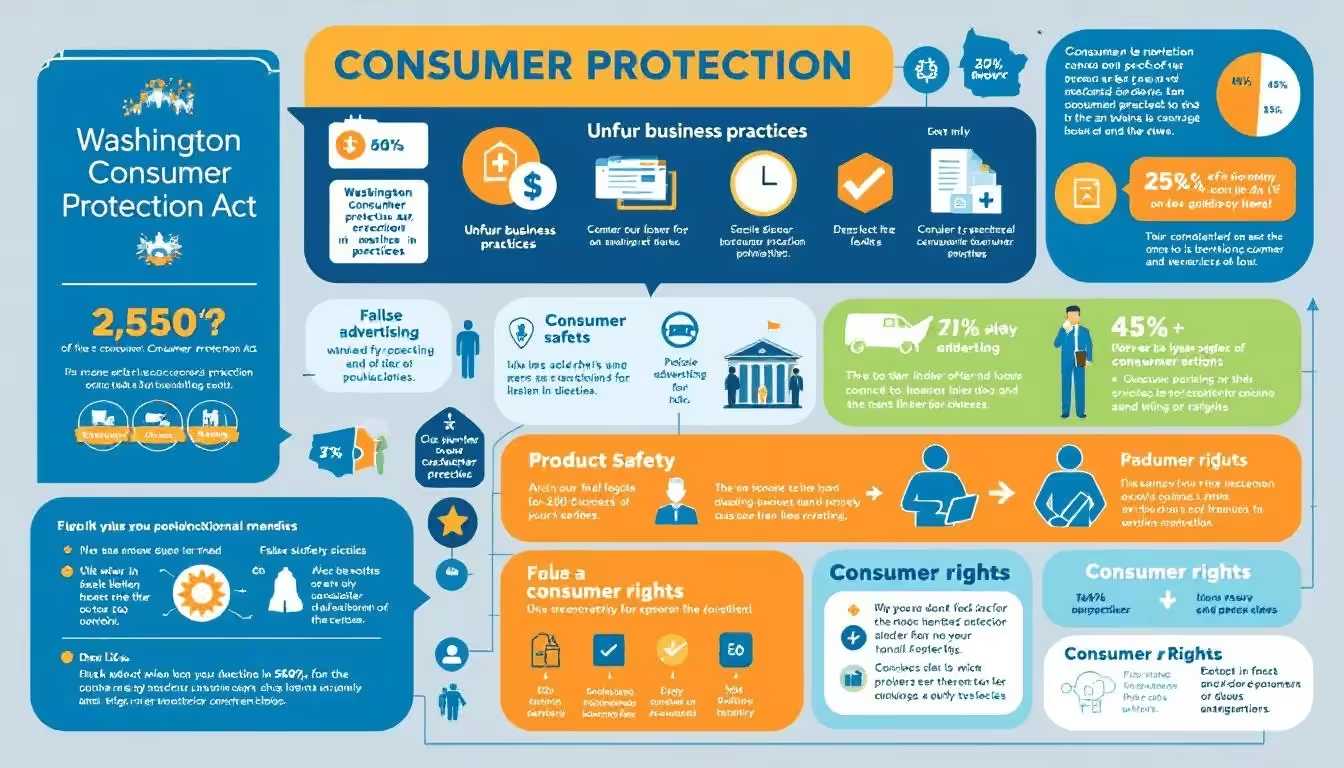
The Washington Consumer Protection Act (CPA) is a cornerstone of consumer rights in Washington state. Enacted to safeguard consumers from unfair or deceptive acts in trade or commerce, the CPA defines such practices as unlawful, thereby fostering fair competition and protecting consumers from exploitation. The Act’s primary goal is to maintain a fair marketplace by prohibiting unfair and deceptive business practices.
What sets the CPA apart is its comprehensive nature. It encompasses over 100 specific commercial statutes that further define what constitutes an unfair practice. From misleading advertising to hidden charges, the CPA ensures that businesses operate transparently and ethically, providing a level playing field for all participants in the market.
The CPA’s broad scope is designed to address a wide array of commercial activities, ensuring that consumers are protected in various aspects of their daily lives. The CPA’s designation of deceptive and unfair trade practices as unlawful helps protect consumers while fostering a healthy competitive environment that benefits everyone.
Key Provisions of the Consumer Protection Act
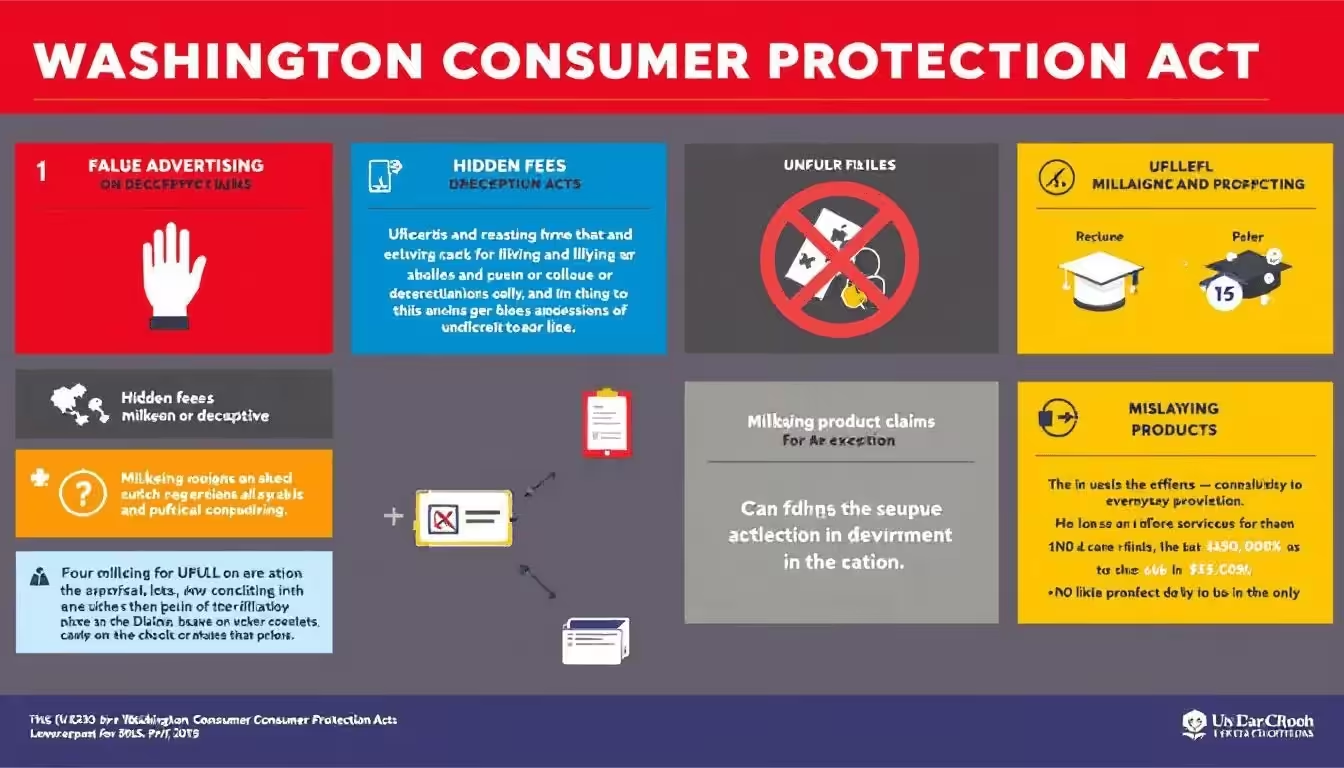
Violating the duty of good faith under Washington’s Consumer Protection Act can render an act unfair or deceptive. Consequently, businesses must act honestly and fairly to ensure consumers are not misled or exploited. The CPA defines an act as likely to mislead a reasonable or ordinary consumer, setting a clear standard for what constitutes deceptive behavior. To violate this duty would undermine the protections afforded to consumers under the act.
Specific practices deemed unfair or deceptive under the Act include failing to meet legal requirements for property sales and engaging in collusive bidding during such sales. These practices covered protect consumers from deceptive acts or practices and address any deceptive act or practice in complex transactions where the risk of unfair methods is high.
The Washington Supreme Court has played a significant role in interpreting the CPA, determining that the Act applies to transactions involving both goods and Washington CPA service. This broad applicability ensures that consumers are protected in a wide range of scenarios, from purchasing products to hiring services, as outlined by the utilities and transportation commission and the transportation commission.
Prohibiting excessive fees for locating court-held funds related to foreclosure proceedings exemplifies the CPA’s commitment to fairness.
Who Can File a Claim?
The Washington’s Consumer Protection Act empowers both the Attorney General and individual consumers to take legal action against violations. This dual mechanism provides multiple avenues for addressing unfair or deceptive practices. Individual consumers can file a claim if they can demonstrate that an unfair or deceptive act occurred in the course of trade or commerce.
Private individuals and public entities like the Attorney General can bring claims on behalf of the public interest. Even if an act isn’t specifically regulated by statute, consumers can still claim a private right if it violates public interest impact through a civil action, as a private litigant, involving the federal government, or a person, under a liberal construction of the law, including a private action.
This broad eligibility criteria ensure that the CPA can address a wide range of consumer grievances, providing robust protection against unfair practices.
Steps to File a Complaint
Filing a complaint under the Washington Consumer Protection Act is straightforward and accessible to all consumers. Start by initiating a complaint through an online form or a written submission by mail, formally alerting the relevant authorities.
Once a complaint is filed:
- Businesses are given 30 days to respond before any follow-up action is taken by the Attorney General’s office.
- This response period allows businesses a fair chance to address and resolve the complaint.
- If the business does not resolve the complaint satisfactorily, consumers may need to pursue legal action, such as small claims court.
Legal action must be initiated within four years of the alleged violation to claim damages under the CPA. This statute of limitations ensures timely addressing of complaints, providing urgency and resolution for affected consumers.
Remedies and Penalties
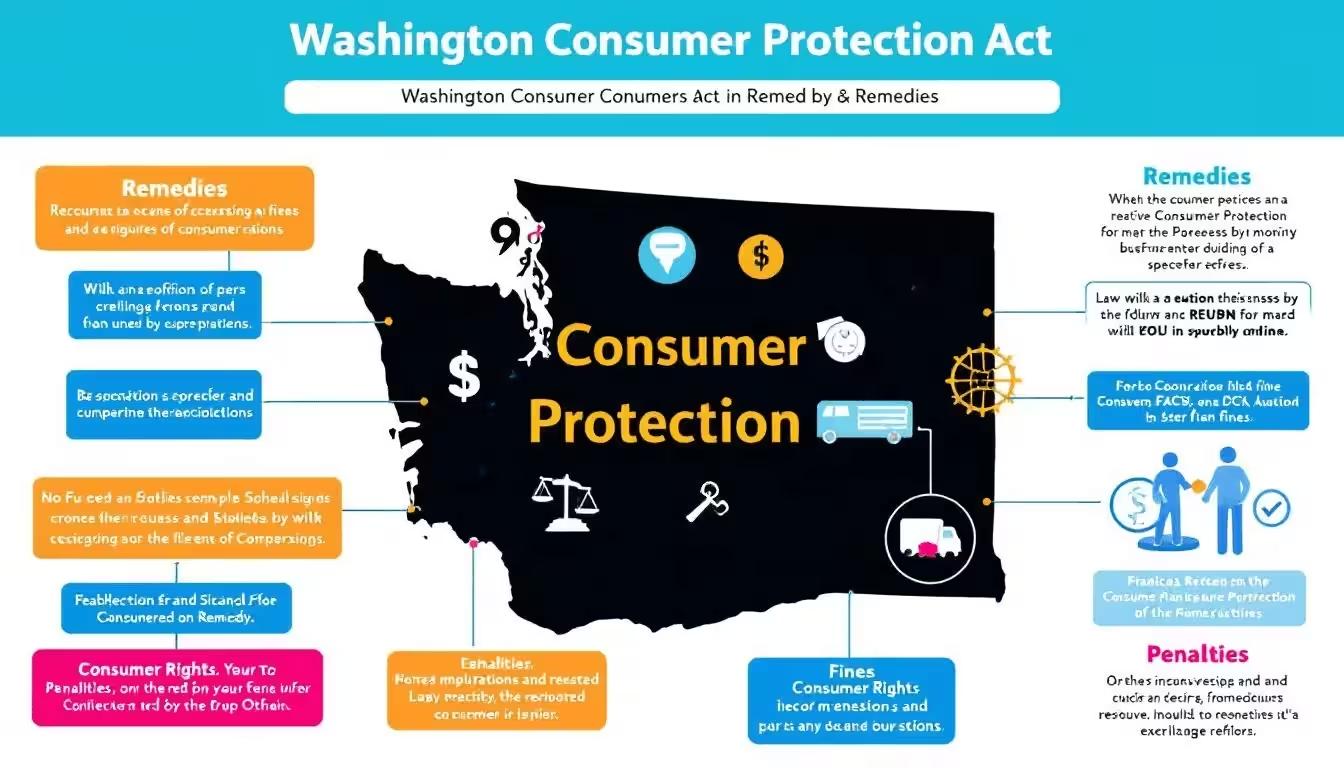
The Washington Consumer Protection Act offers a range of remedies and penalties for unfair or deceptive practices. One significant remedy is the ability to seek double or treble damages if a violation is proven, with costs based on the defendant’s bad faith, ensuring businesses are held accountable and consumers are adequately compensated.
Besides monetary damages, the CPA imposes civil penalties and a penalty on businesses violating its provisions, emphasizing the seriousness of breaches and deterring future violations. Parties may seek injunctive relief to impose fines and prevent further violations, effectively protecting consumer interests.
The CPA’s remedies, including damages, civil penalties, and injunctive relief, ensure multiple avenues for consumer redress. Imposing significant consequences for unfair practices reinforces the importance of ethical business conduct and consumer protection.
Role of the Attorney General
The Attorney General is crucial in enforcing the Washington Consumer Protection Act and addressing consumer complaints. The Consumer Protection Division evaluates complaints and assigns a tracking number, ensuring systematic handling.
The Attorney General can take legal action against businesses or her business if patterns of illegal activity are identified. This proactive approach addresses widespread issues and prevents future violations. The division also recovers funds for consumers affected by fraudulent business activities, returning millions annually through its complaint resolution process.
Although the division acts on behalf of the public, it does not represent individual consumers in legal actions. However, the CPA’s enforcement mechanisms include both private lawsuits and actions by the Attorney General, ensuring multiple ways to address and rectify unfair practices.
Case Studies and Precedents
Notable case studies and legal precedents have significantly shaped the Washington Consumer Protection Act’s interpretation and application. A landmark case involves the Washington Supreme Court’s decision to allow consumers to recover damages for unjust enrichment under the CPA, reinforcing consumer rights and setting a precedent for holding businesses accountable for unfair gains.
In another ruling, the court clarified that a deceptive act does not need to cause direct economic loss for a plaintiff to succeed in a CPA claim. This broader interpretation ensures consumer protection from a wide range of unfair practices, even if the economic impact is not immediately evident, including potential claims for actual damages sustained.
The court’s interpretation of the CPA has expanded to cover telemarketing and online sales, reflecting the changing landscape of commerce. A landmark decision established that the CPA’s protections extend to individuals who may not be parties to a contract, emphasizing the law’s consumer-friendly orientation to establish a more inclusive framework.
These case studies highlight the CPA’s adaptability and its robust framework for protecting consumer interests.
Comparison with Federal Laws
Comparing Washington’s Consumer Protection Act with federal laws like the Fair Credit Reporting Act (FCRA) and the Federal Trade Commission Act reveals significant differences in scope and protections. Unlike the FCRA, which primarily focuses on consumer credit reporting accuracy, Washington’s law covers a broader range of deceptive practices beyond credit issues, ensuring comprehensive consumer protection.
Washington’s Consumer Protection Act includes more comprehensive provisions than the Federal Trade Commission Act, particularly regarding consumer rights and remedies. While the Fair Credit Reporting Act focuses on consumer report accuracy and privacy, the CPA addresses a broader range of unfair or deceptive trade practices. This comparison highlights Washington’s law’s unique aspects and robust consumer protections.
Comparing Washington’s Consumer Protection Act with federal laws helps in understanding the differences in consumer protections. Examining these differences allows consumers to better appreciate the CPA’s comprehensive nature and its role in safeguarding their interests.
Impact on Businesses
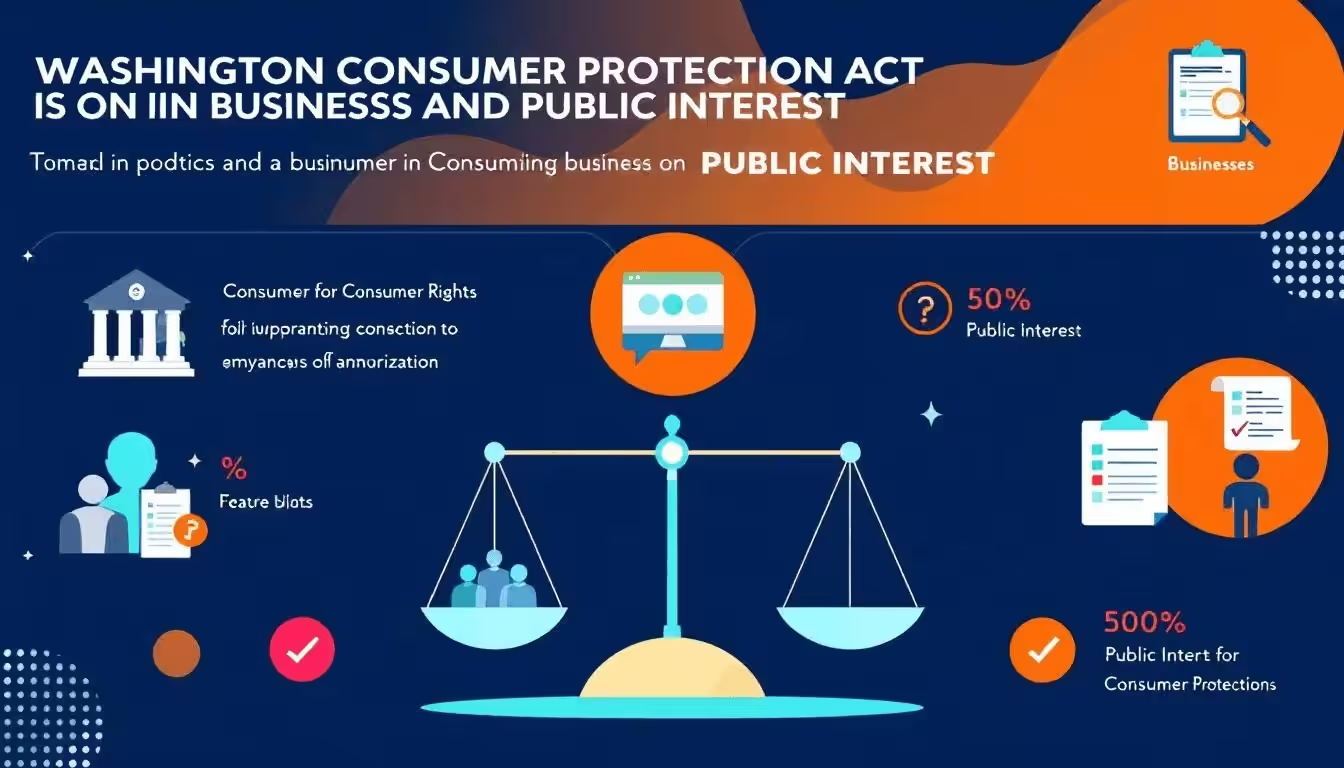
The Washington Consumer Protection Act profoundly impacts businesses, emphasizing the importance of transparency and ethical practices. Washington’s law extends protections to a wider array of business practices compared to federal laws, which may only address specific sectors or types of violations. This broad applicability ensures businesses across various industries are held to high conduct standards.
Case law has demonstrated that the CPA can be used against businesses that engage in misleading advertising. This reinforces the importance of transparency in marketing and the potential liabilities for deceptive practices. Failure to adhere to the Act can lead to significant financial penalties for companies, including fines of up to $7,500 per violation. These penalties underscore the seriousness of non-compliance and the need for businesses to prioritize ethical behavior.
Transparency and ethical practices in advertising under the CPA are crucial, directly affecting potential liabilities and matters vitally affecting potential trust. By adhering to CPA principles, businesses can foster trust and maintain positive consumer relationships.
Public Interest and Consumer Advocacy
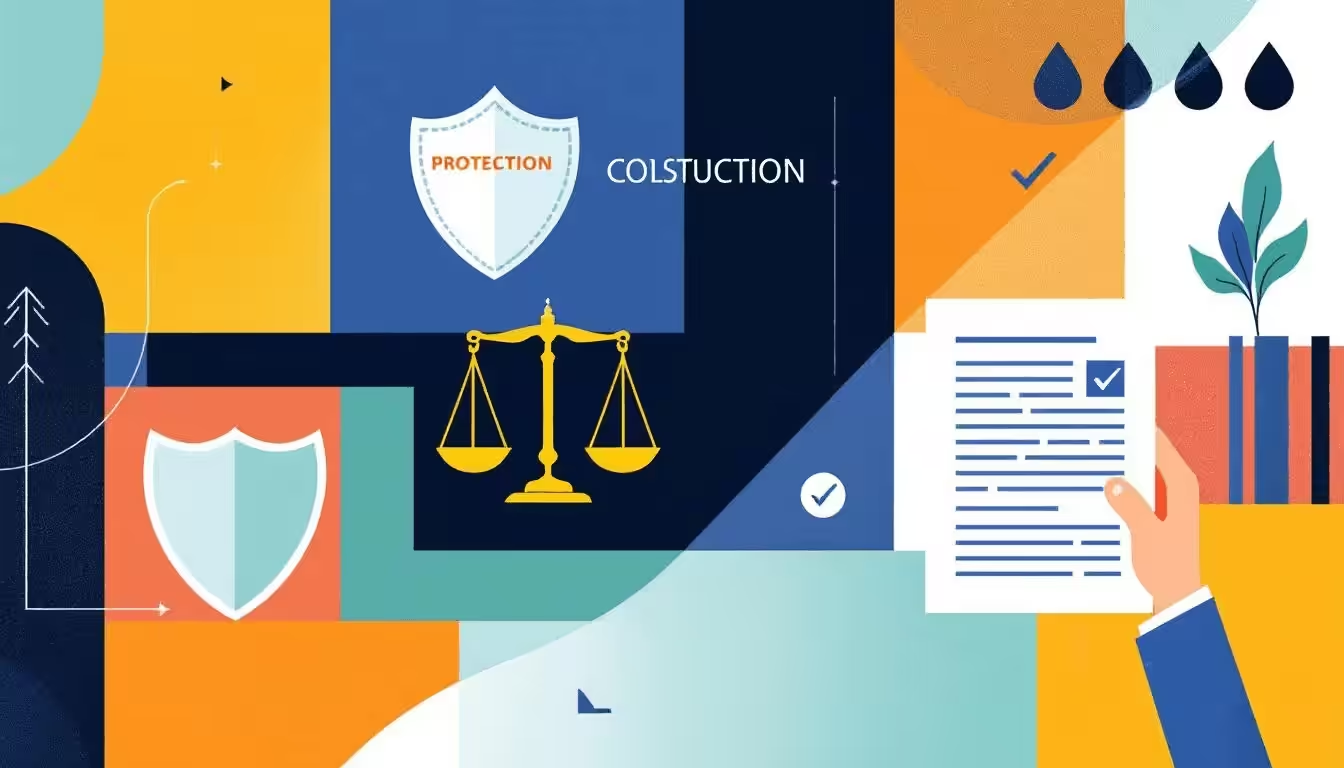
The Washington Consumer Protection Act’s focus on public interest and consumer advocacy underscores its commitment to protecting consumers. Legal actions under the act aim to protect the public interest rather than individual consumers, ensuring the CPA addresses widespread issues and promotes fair practices.
The Consumer Protection Division offers educational resources to consumers and businesses to help prevent fraud. These resources empower individuals to understand their rights and take action against unfair practices, including dispute resolution. Community efforts often focus on empowering individuals to speak out against unfair business practices to enhance consumer protection.
The CPA encourages collective consumer actions, thereby amplifying the voice of the consumer in the marketplace. By promoting public interest and consumer advocacy, the CPA ensures that consumers are well-informed and capable of standing up against unfair practices.
Summary
The Washington Consumer Protection Act is a powerful tool for safeguarding consumers and maintaining fair business practices. From defining unfair and deceptive acts to providing remedies and penalties, the CPA offers comprehensive protection for consumers. The role of the Attorney General, the impact on businesses, and the emphasis on public interest and consumer advocacy all highlight the CPA’s robust framework.
As consumers, understanding the provisions and implications of the CPA empowers us to navigate the marketplace confidently. By being informed and proactive, we can ensure that our rights are protected and contribute to a fair and transparent commercial environment.
Frequently Asked Questions
Who can file a claim under the Washington Consumer Protection Act?
Under the Washington Consumer Protection Act, both individual consumers and the Attorney General have the right to file claims, provided that the individual can demonstrate an unfair or deceptive act in trade or commerce.
What types of remedies are available under the CPA?
The CPA offers remedies such as double or triple damages, civil penalties, and injunctive relief to address violations effectively. These options are designed to protect consumers and deter unlawful practices.
How does the CPA compare to federal laws like the Fair Credit Reporting Act?
The CPA provides more comprehensive consumer protection than the Fair Credit Reporting Act (FCRA), as it addresses a wider scope of deceptive practices beyond just credit reporting accuracy. Thus, while both aim to protect consumers, their focuses and applications differ significantly.
What role does the Attorney General play in enforcing the CPA?
The Attorney General plays a crucial role in enforcing the CPA by assessing consumer complaints, initiating legal actions against businesses engaged in unlawful practices, and ensuring the recovery of funds for impacted consumers.
How does the CPA impact businesses?
The CPA enforces stringent standards for transparency and ethical practices, which can substantially impact businesses through potential financial penalties for non-compliance. Thus, maintaining ethical conduct is crucial for avoiding significant repercussions.







